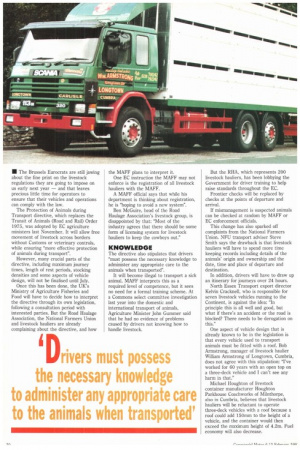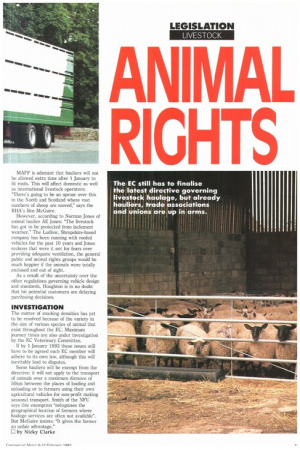rivers must possess the necessary knowledge to administer any appropriate care to the animals when transported'
Page 36

Page 37

If you've noticed an error in this article please click here to report it so we can fix it.
But the RHA, which represents 200 livestock hauliers, has been lobbying the Government for driver training to help raise standards throughout the EC.
Frontier checks will be replaced by checks at the points of departure and arrival.
If mismanagement is suspected animals can be checked at random by MAFF or EC enforcement officials.
This change has also sparked off complaints from the National Farmers Union. NFU transport adviser Steve Smith says the drawback is that livestock hauliers will have to spend more time keeping records including details of the animals' origin and ownership and the date, time and place of departure and destination.
In addition, drivers will have to draw up an itinerary for journeys over 24 hours.
North Essex Transport export director Kelvin Craclmell, who is responsible for seven livestock vehicles running to the Continent, is against the idea: "In principle this is all well and good, but what if there's an accident or the road is blocked? There needs to be derogation on this."
One aspect of vehicle design that is already known to be in the legislation is that every vehicle used to transport animals must be fitted with a roof. Bob Armstrong, manager of livestock haulier William Armstrong of Longtown, Cumbria, does not agree with this stipulation: "I've worked for 60 years with an open top on a three-deck vehicle and I can't see any harm in that."
Michael Houghton of livestock container manufacturer Houghton Parkhouse Coachworks of Milnthorpe, also in Cumbria, believes that livestock hauliers will be reluctant to operate three-deck vehicles with a roof because a roof could add 150mm to the height of a vehicle, and the container would then exceed the maximum height of 4.2m, Fuel economy will also decrease. MAFF is adamant that hauliers will not be allowed extra time after 1 January to fit roofs. This will affect domestic as well as international livestock operators: "There's going to be an uproar over this in the North and Scotland where vast numbers of sheep are moved," says the RHA's Ben McGuire.
However, according to Norman Jones of animal haulier AE Jones: The livestock has got to be protected from inclement weather." The Ludlow, Shropshire-based company has been running with roofed vehicles for the past 10 years and Jones reckons that were it not for fears over providing adequate ventilation, the general public and animal rights groups would be much happier if the animals were totally enclosed and out of sight.
As a result of the uncertainty over the other regulations governing vehicle design and standards, Houghton is in no doubt that his potential customers are delaying purchasing decisions,
INVESTIGATION
The matter of stocking densities has yet to be resolved because of the variety in the size of various species of animal that exist throughout the EC. Maximum journey times are also under investigation by the EC Veterinary Committee.
If by 1 January 1993 these issues still have to be agreed each EC member will adhere to its own law, although this will inevitably lead to disputes.
Some hauliers will be exempt from the directive: it will not apply to the transport of animals over a maximum distance of 50km between the places of loading and unloading or to farmers using their own agricultural vehicles for non-profit making seasonal transport. Smith of the NFU says this exemption "retognises the geographical location of farmers where haulage services are often not available". But McGuire insists: "It gives the farmer an unfair advantage."
E by Nicky Clarke




































































































